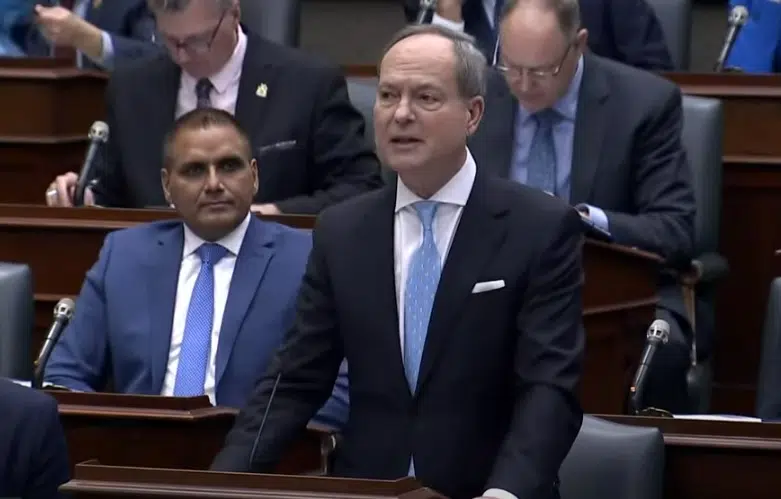
Peter Bethlenfalvy, Ontario Finance Minister, March 24, 2023. Queen's Park screen shot
The Ford government is promising a balanced budget by 2025.
Finance Minister Peter Bethlenfalvy says strong revenue will lead to a deficit of 1.3 billion dollars in the next fiscal year, leading to a surplus of 200 million dollars in the next.
He says they will do so while continuing critical investments.
“This plan is our blueprint for building a strong province during a time of economic challenges and change. It is a plan for a strong economy. Now and for the future. It is a plan to build more roads, more highways, more transit and more broadband. It is a plan to build new long-term-care homes, new hospitals, schools and child care spaces. It is a plan to build the critical minerals sector in Ontario’s north,” says Bethlenfalvy.
Bethlenfalvy says the budget also navigates ongoing global economic uncertainty, with a targeted approach to helping people and businesses.
“While we remains resilient, the seas around us are stormy. And our budget must reflect that with continued prudence and planning assumptions that leave room for future surprises or shocks.”
The government’s plan is taking significant actions to drive growth by lowering costs, getting key infrastructure projects built faster, and attracting more jobs and investment to help businesses, families and workers.
Highlights include:
- Launching the new Ontario Made Manufacturing Investment Tax Credit, which would provide a 10 per cent refundable Corporate Income Tax credit to help local manufacturers lower their costs, invest in workers, innovate and become more competitive.
- Advancing Ontario’s Critical Minerals Strategy, which supports better supply chain connections between industries, resources and workers in Northern Ontario and manufacturing in Southern Ontario. The government is investing an additional $3 million in 2023–24 and $3 million in 2024–25 in the Ontario Junior Exploration Program to help more companies search for potential mineral deposits and attract further investments in this growing sector. The government is also continuing work to build the roads to the Ring of Fire.
- Attracting over $16 billion in investments by global automakers and suppliers of EV batteries and battery materials to position Ontario as a global leader on the EV supply chain.
- Providing $224 million in 2023–24 for a new capital stream of the Skills Development Fund to leverage private-sector expertise and expand training centres.
- Enhancing the Ontario Immigrant Nominee Program with an additional $25 million over three years to attract more skilled workers, including in-demand professionals in the skilled trades, to the province.
Bethlenfalvy says they are also working to keep costs down and provide better services.
Highlights include:
- Providing financial support to more seniors by proposing changes to expand the Guaranteed Annual Income System (GAINS) program, starting in July 2024, to see 100,000 additional seniors be eligible for the program and the benefit adjusted annually to inflation.
- Calling on the federal government to defer the Harmonized Sales Tax (HST) on all new large scale purpose-built rental housing projects to tackle the ongoing housing affordability crisis.
- Investing in supportive housing with an additional $202 million each year in the Homelessness Prevention Program and Indigenous Supportive Housing Program to help those experiencing or at risk of homelessness, struggling with mental health and substance use, those escaping intimate partner violence, and support the community organizations delivering supportive housing.
- Helping more Ontario students becoming doctors by investing an additional $33 million over three years to add 100 undergraduate seats beginning in 2023, as well as 154 postgraduate medical training seats to prioritize Ontario residents trained at home and abroad beginning in 2024 and going forward.
- Starting in fall 2023, expanding the program to allow pharmacists to prescribe over-the-counter medication for more common ailments, including mild to moderate acne, canker sores, diaper dermatitis, yeast infection, pinworms and threadworms, and nausea and vomiting in pregnancy.
- Providing an additional $425 million over three years to connect more people to mental health and addictions services, including a five per cent increase in the base funding of community-based mental health and addictions services providers funded by the Ministry of Health.
- Continuing the 2022 Budget commitment to invest $1 billion over three years to get more people connected to care in the comfort of their own home and community. The government is now accelerating investments to bring funding in 2023–24 up to $569 million, including nearly $300 million to support contract rate increases to stabilize the home and community care workforce.
“With our thoughtful, transparent approach we have a plan to balance the budget while delivering support to families, workers, and businesses across Ontario,” said Minister Bethlenfalvy.



